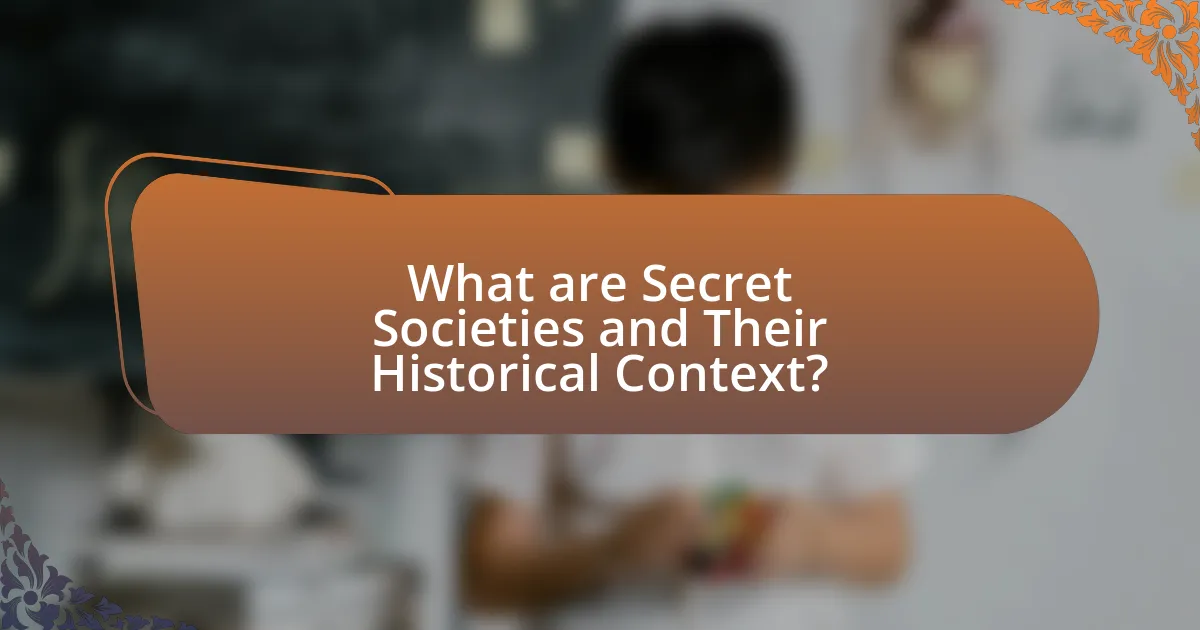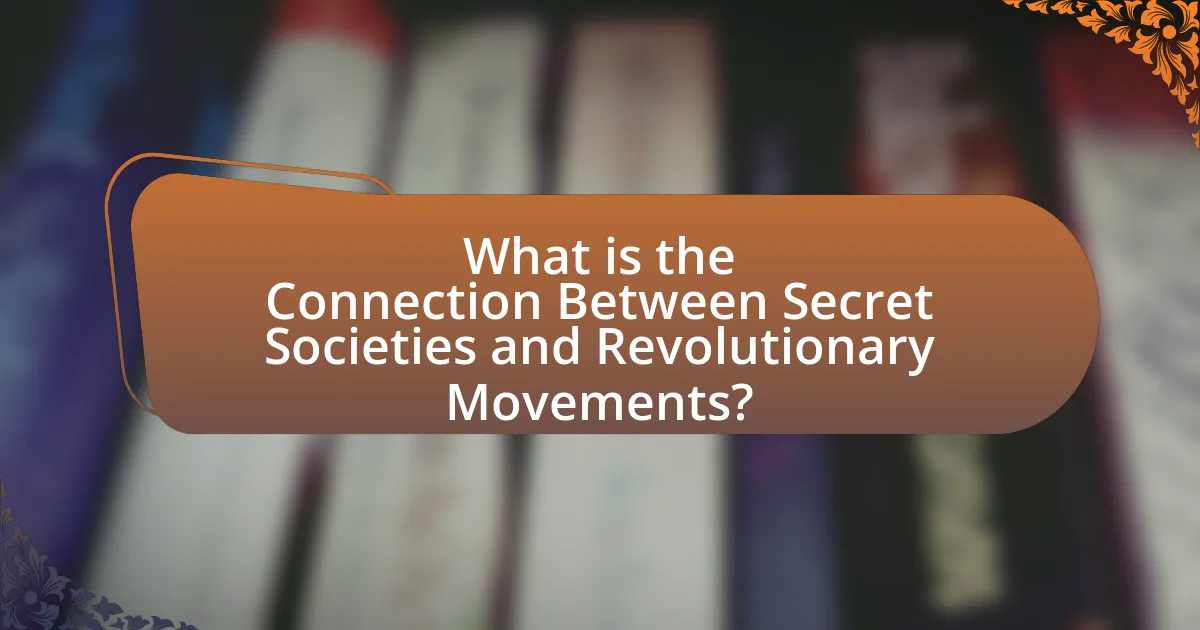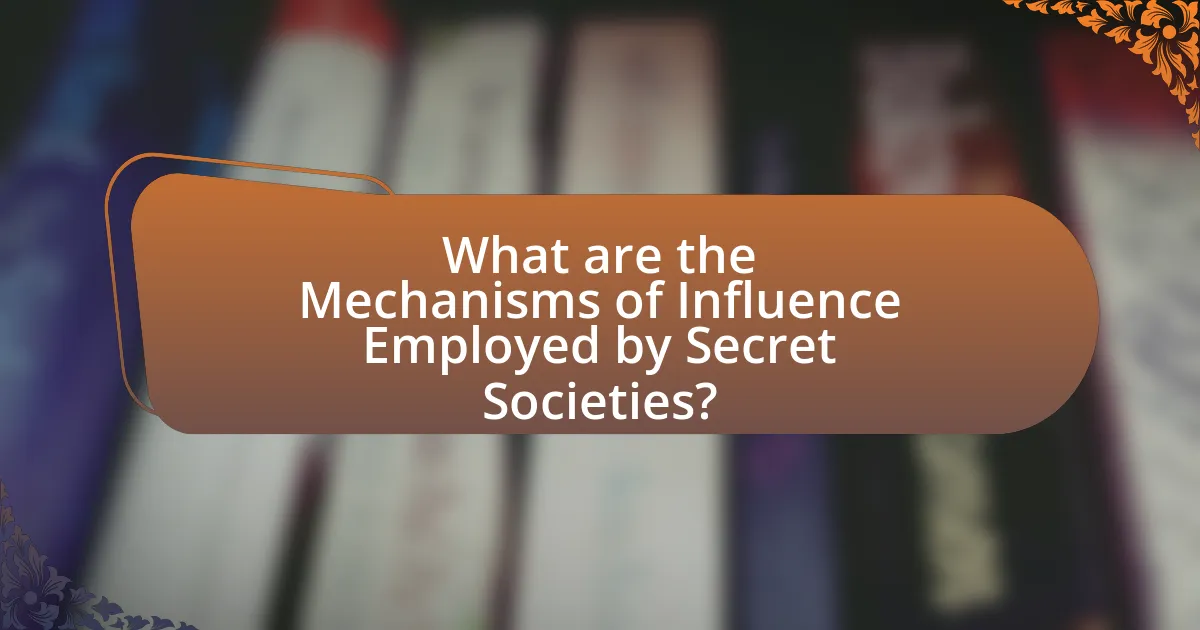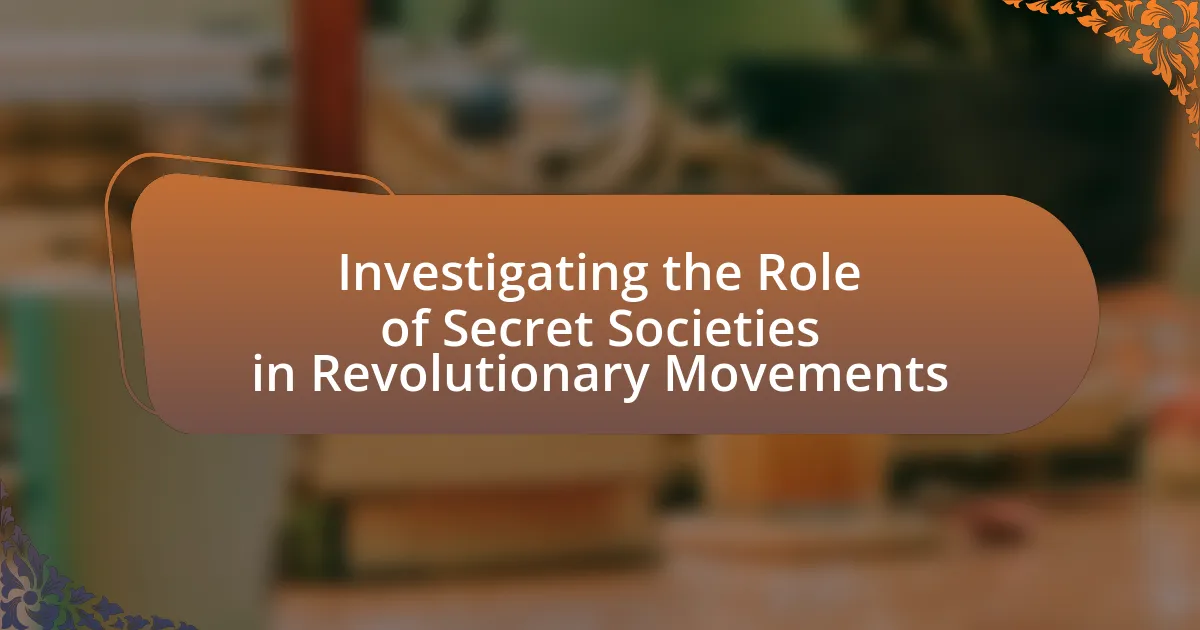Secret societies, such as the Freemasons and the Illuminati, have historically played significant roles in revolutionary movements by promoting ideals of liberty, equality, and social reform. These organizations operated in secrecy, facilitating communication and collaboration among influential leaders during pivotal events like the American and French Revolutions. The article explores how secret societies influenced historical events, their notable examples, the motivations for membership, and the mechanisms they employed to mobilize support. Additionally, it examines the risks associated with involvement in these societies and the lessons modern movements can learn from their historical impact on revolutionary ideologies and actions.

What are Secret Societies and Their Historical Context?
Secret societies are organizations that operate in secrecy, often with exclusive membership and hidden agendas, historically influencing political, social, and cultural movements. These societies, such as the Freemasons and the Illuminati, emerged during periods of social upheaval, like the Enlightenment and the French Revolution, where they sought to promote ideals of liberty, equality, and fraternity. For instance, the Freemasons played a significant role in the American Revolution by fostering a network of influential leaders who shared Enlightenment values, while the Illuminati aimed to promote rationalism and secularism in society. Their historical context is marked by a reaction against authoritarian regimes and a desire for reform, demonstrating their impact on revolutionary movements throughout history.
How have secret societies influenced historical events?
Secret societies have significantly influenced historical events by orchestrating political movements and revolutions. For instance, the Freemasons played a crucial role in the American Revolution, with many founding fathers, including George Washington and Benjamin Franklin, being members. Their network facilitated the exchange of revolutionary ideas and strategies, contributing to the colonies’ fight for independence from British rule. Similarly, the Carbonari, a secret society in Italy, was instrumental in the unification of Italy during the 19th century, promoting nationalist sentiments and coordinating uprisings against foreign domination. These examples illustrate how secret societies have acted as catalysts for change, shaping the course of history through organized efforts and shared ideologies.
What are some notable secret societies throughout history?
Notable secret societies throughout history include the Freemasons, the Illuminati, and the Rosicrucians. The Freemasons, founded in the late 16th to early 17th century, have played a significant role in various political movements, promoting Enlightenment ideals. The Illuminati, established in 1776 in Bavaria, aimed to promote rationalism and secularism, influencing revolutionary thought. The Rosicrucians, originating in the early 17th century, combined mysticism with scientific inquiry, impacting cultural and intellectual movements. Each of these societies has been linked to significant historical events and ideologies, demonstrating their influence on revolutionary movements.
How did the goals of these societies align with revolutionary movements?
The goals of secret societies often aligned with revolutionary movements by promoting ideals of liberty, equality, and social reform. For instance, during the Enlightenment, societies like the Freemasons advocated for democratic principles and individual rights, which directly influenced revolutionary sentiments in events such as the American and French Revolutions. Historical evidence shows that many revolutionaries were members of these societies, utilizing their networks to disseminate revolutionary ideas and mobilize support. The alignment of these goals facilitated the organization and execution of revolutionary actions, as seen in the collaboration between Masonic lodges and revolutionary leaders in both the United States and France.
Why do individuals join secret societies?
Individuals join secret societies primarily for a sense of belonging and community. These organizations often provide members with exclusive networks, shared values, and a platform for social interaction that may not be available in their everyday lives. Historical evidence shows that many individuals are drawn to secret societies for the promise of influence and power, as seen in groups like the Freemasons, which have historically included influential political and social leaders. Additionally, the allure of secrecy and the potential for personal advancement through connections and insider knowledge further motivate individuals to seek membership in these societies.
What motivations drive members to participate in these organizations?
Members participate in secret societies primarily for the pursuit of shared ideological goals, social networking, and the desire for influence. These organizations often attract individuals who seek to promote specific political or social agendas, as evidenced by historical examples such as the Freemasons and their role in the American Revolution, where members aimed to foster democratic ideals. Additionally, the social aspect of these societies provides a sense of belonging and camaraderie, which can be particularly appealing in times of political unrest. The influence gained through membership can also empower individuals to effect change within their communities or nations, as seen in various revolutionary movements where secret societies played pivotal roles in mobilizing support and resources.
How do secret societies recruit new members?
Secret societies typically recruit new members through a combination of personal invitations, referrals from existing members, and selective outreach based on shared interests or backgrounds. These societies often prioritize confidentiality and discretion, which can involve vetting potential recruits to ensure alignment with the group’s values and objectives. Historical examples, such as the Freemasons, illustrate this recruitment method, where existing members would invite individuals who demonstrated qualities deemed desirable, such as integrity and social standing. This selective process helps maintain the society’s exclusivity and ensures that new members are likely to contribute positively to the group’s goals.

What is the Connection Between Secret Societies and Revolutionary Movements?
Secret societies often play a significant role in revolutionary movements by providing a structured network for like-minded individuals to organize, share ideas, and mobilize resources. Historically, groups such as the Freemasons and the Illuminati have been linked to various revolutions, including the American and French Revolutions, where they facilitated communication and collaboration among revolutionaries. For instance, many Founding Fathers of the United States were Freemasons, which helped them coordinate efforts against British rule. Additionally, the French Revolution saw the influence of secret societies that promoted Enlightenment ideals, contributing to the overthrow of the monarchy. These societies often operate in secrecy, allowing them to evade government scrutiny and effectively strategize for change.
How have secret societies contributed to revolutionary ideologies?
Secret societies have significantly contributed to revolutionary ideologies by providing a platform for the exchange of radical ideas and fostering a sense of solidarity among like-minded individuals. For instance, the Freemasons and the Illuminati played crucial roles in the Enlightenment, promoting principles such as liberty, equality, and fraternity, which later influenced revolutions like the American and French Revolutions. Historical evidence shows that many leaders of these revolutions were members of secret societies, which facilitated the organization and mobilization of revolutionary efforts. The clandestine nature of these societies allowed for the safe discussion of revolutionary ideas in oppressive political climates, ultimately shaping the ideologies that drove significant societal changes.
What specific ideologies have been promoted by these societies?
Secret societies have promoted ideologies such as Enlightenment rationalism, anti-monarchism, and social equality. For instance, the Freemasons advocated for Enlightenment principles, emphasizing reason and individual rights, which influenced revolutionary thought during the American and French Revolutions. The Illuminati, founded in 1776, sought to promote secularism and challenge religious and political authority, aligning with anti-monarchist sentiments. Additionally, various secret societies have championed social equality, as seen in the role of the Carbonari in Italy, who aimed to unify the country and promote democratic governance. These ideologies significantly shaped revolutionary movements by providing frameworks for challenging existing power structures.
How do these ideologies manifest in revolutionary actions?
Ideologies manifest in revolutionary actions through organized efforts that challenge existing power structures, often driven by the beliefs and principles of secret societies. For instance, the Enlightenment ideals of liberty and equality inspired the American Revolution, where groups like the Freemasons played a crucial role in mobilizing support for independence. Similarly, the French Revolution was significantly influenced by the philosophies of the Enlightenment, with secret societies such as the Jacobins advocating for radical social change and the overthrow of the monarchy. These ideologies provide a framework for collective action, uniting individuals around common goals and justifying their revolutionary activities.
What role did secret societies play in specific revolutions?
Secret societies played a significant role in various revolutions by facilitating communication, organizing resistance, and promoting revolutionary ideas. For instance, the Freemasons were instrumental in the American Revolution, as many founding fathers were members, using their networks to spread Enlightenment ideals and mobilize support against British rule. Similarly, the Carbonari, a secret society in Italy, contributed to the unification movement in the 19th century by orchestrating uprisings and fostering nationalist sentiments among the populace. In the Russian Revolution, the Socialist Revolutionary Party, which operated in secrecy, helped to galvanize support for the overthrow of the Tsarist regime, ultimately leading to the establishment of a socialist government. These examples illustrate how secret societies not only provided a platform for revolutionary thought but also actively engaged in the planning and execution of revolutionary actions.
How did secret societies influence the American Revolution?
Secret societies significantly influenced the American Revolution by fostering revolutionary ideas and organizing resistance against British rule. Groups such as the Sons of Liberty played a crucial role in mobilizing public sentiment against taxation without representation, particularly through events like the Boston Tea Party in 1773. These societies provided a network for communication and coordination among colonists, facilitating protests and disseminating pamphlets that articulated the case for independence. Their clandestine nature allowed for strategic planning and the ability to evade British authorities, which was essential in the early stages of the revolution.
What impact did secret societies have during the French Revolution?
Secret societies significantly influenced the French Revolution by fostering revolutionary ideas and facilitating political organization among dissenters. Groups such as the Jacobins and the Freemasons played crucial roles in promoting Enlightenment principles, which challenged the existing monarchy and social order. The Jacobins, for instance, organized politically to push for radical changes, leading to the establishment of the First French Republic in 1792. Their clandestine meetings allowed for the exchange of revolutionary ideas and strategies, which mobilized public support against the monarchy. Additionally, the Freemasons contributed to the spread of Enlightenment thought, emphasizing liberty, equality, and fraternity, which became foundational principles of the Revolution. These societies not only provided a network for like-minded individuals but also acted as catalysts for the broader revolutionary movement, ultimately shaping the course of French history.

What are the Mechanisms of Influence Employed by Secret Societies?
Secret societies employ various mechanisms of influence, including networking, secrecy, and ideological indoctrination. Networking allows members to establish connections that facilitate the exchange of information and resources, which can be pivotal in mobilizing support for revolutionary movements. Secrecy creates an exclusive environment that fosters loyalty and commitment among members, enhancing their ability to coordinate actions without external scrutiny. Ideological indoctrination reinforces shared beliefs and goals, ensuring that members are aligned in their objectives and strategies. Historical examples, such as the Freemasons during the American Revolution, illustrate how these mechanisms effectively contributed to political change by uniting individuals around common causes and facilitating organized efforts against established authorities.
How do secret societies operate within revolutionary movements?
Secret societies operate within revolutionary movements by providing a structured network for organizing dissent, sharing information, and mobilizing resources. These groups often function in secrecy to protect their members from government repression and to facilitate clandestine activities. Historical examples include the Freemasons during the American Revolution, who used their networks to promote revolutionary ideas and coordinate actions against British rule. Additionally, the Carbonari in Italy played a crucial role in the unification movement by fostering revolutionary sentiment and organizing uprisings against oppressive regimes. Their effectiveness is often attributed to their ability to maintain secrecy, create loyalty among members, and execute strategic plans that align with broader revolutionary goals.
What strategies do they use to mobilize support?
Secret societies mobilize support through clandestine networking, propaganda dissemination, and strategic recruitment. These organizations often leverage their secrecy to create an aura of exclusivity, which attracts individuals seeking belonging and purpose. Historical examples include the Freemasons, who utilized their lodges as meeting points for political discourse and action, and the Jacobins during the French Revolution, who effectively spread revolutionary ideas through pamphlets and public meetings. Such strategies have proven effective in uniting individuals around common goals, facilitating collective action, and influencing broader revolutionary movements.
How do they maintain secrecy while influencing public opinion?
Secret societies maintain secrecy while influencing public opinion through covert communication methods, selective membership, and strategic use of misinformation. These organizations often utilize encrypted messages, private meetings, and coded language to ensure that their discussions and plans remain confidential. For instance, historical examples such as the Freemasons and the Illuminati demonstrate how these groups employed rituals and symbols to convey messages among members while obscuring their intentions from outsiders. Additionally, by controlling narratives and disseminating propaganda through trusted channels, they can shape public perception without revealing their involvement, as seen in various revolutionary movements where clandestine groups played pivotal roles in mobilizing support while remaining hidden from scrutiny.
What are the potential risks and consequences of secret society involvement?
Involvement in secret societies can lead to significant risks and consequences, including social ostracism, legal repercussions, and ethical dilemmas. Members may face isolation from mainstream society due to the clandestine nature of these groups, which can result in damaged personal relationships and reputational harm. Legally, participation in secret societies can expose individuals to scrutiny and potential charges if the society engages in illegal activities, as seen in historical cases like the Skull and Bones society at Yale, which has faced allegations of elitism and conspiracy. Ethically, members may grapple with conflicting loyalties and moral compromises, particularly if the society’s objectives clash with broader societal values, as evidenced by the actions of groups like the Freemasons during political upheavals.
How can secret societies undermine or support revolutionary goals?
Secret societies can both undermine and support revolutionary goals through their influence on political dynamics and social movements. They may undermine revolutionary efforts by fostering division among groups, creating distrust, or infiltrating movements to redirect their objectives, as seen in historical instances like the infiltration of socialist groups by intelligence agencies. Conversely, secret societies can support revolutionary goals by providing resources, strategic planning, and a network of like-minded individuals, exemplified by the role of the Freemasons in the American Revolution, where they facilitated communication and collaboration among revolutionaries. Thus, the impact of secret societies on revolutionary movements is multifaceted, depending on their intentions and actions within the sociopolitical landscape.
What historical examples illustrate these risks?
Historical examples illustrating the risks associated with secret societies in revolutionary movements include the Jacobins during the French Revolution and the Carbonari in Italy. The Jacobins, who were instrumental in the Reign of Terror from 1793 to 1794, exemplified how radical factions within secretive groups can lead to extreme violence and political purges, resulting in thousands of executions. Similarly, the Carbonari, active in the early 19th century, faced repression from established authorities, leading to violent crackdowns and the eventual failure of their revolutionary aims in Italy. These instances demonstrate the potential for internal conflict, state repression, and unintended consequences that can arise from the clandestine nature of such organizations.
What lessons can be learned from the role of secret societies in revolutions?
Secret societies often play a crucial role in revolutions by facilitating organization, communication, and the spread of revolutionary ideas. These groups can operate covertly, allowing members to strategize and mobilize without attracting the attention of oppressive regimes. For instance, the Freemasons and the Carbonari were instrumental in various European revolutions, providing a network for like-minded individuals to collaborate and share resources. Historical evidence shows that the American Revolution was significantly influenced by secret societies like the Sons of Liberty, which organized protests against British rule and disseminated revolutionary literature. Thus, the lessons learned include the importance of clandestine organization in fostering revolutionary movements and the effectiveness of shared ideologies in uniting disparate groups toward a common goal.
How can modern movements apply these lessons?
Modern movements can apply the lessons from historical secret societies by fostering strong networks of trust and shared purpose among members. These networks enable effective communication and coordination, as seen in the American Revolution, where groups like the Sons of Liberty organized resistance against British rule. Additionally, modern movements can utilize secrecy to protect their strategies and members from opposition, similar to how the Freemasons operated in the 18th century. By understanding the importance of symbolism and rituals in building solidarity, contemporary movements can create a sense of identity and commitment among participants, enhancing their overall impact and resilience.
What best practices can be derived from historical examples?
Best practices derived from historical examples of secret societies in revolutionary movements include the importance of strategic secrecy, the establishment of strong networks, and the cultivation of ideological commitment among members. For instance, the Freemasons played a crucial role in the American Revolution by fostering connections among influential figures while maintaining discretion about their activities. Additionally, the Carbonari in Italy demonstrated the effectiveness of grassroots mobilization and the use of coded communication to evade government surveillance. These historical instances illustrate that successful revolutionary movements often rely on well-organized, secretive structures that promote unity and shared goals among participants.
